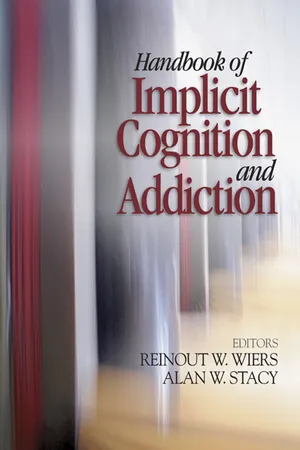
This is a test
- 560 pages
- English
- PDF
- Available on iOS & Android
eBook - PDF
Handbook of Implicit Cognition and Addiction
Book details
Table of contents
Citations
About This Book
For the first time, research on implicit cognitive processes relevant for the understanding of addictive behaviors and their prevention or treatment is brought together in one volume! The Handbook of Implicit Cognition and Addiction features the work of an internationally renowned group of contributing North American and European authors who draw together developments in basic research on implicit cognition with recent developments in addiction research. Editors Reinout W. Wiers and Alan W. Stacy examine recent findings from a variety of disciplines including basic memory and experimental psychology, experimental psychopathology, emotion, and neurosciences.
Frequently asked questions
At the moment all of our mobile-responsive ePub books are available to download via the app. Most of our PDFs are also available to download and we're working on making the final remaining ones downloadable now. Learn more here.
Both plans give you full access to the library and all of Perlego’s features. The only differences are the price and subscription period: With the annual plan you’ll save around 30% compared to 12 months on the monthly plan.
We are an online textbook subscription service, where you can get access to an entire online library for less than the price of a single book per month. With over 1 million books across 1000+ topics, we’ve got you covered! Learn more here.
Look out for the read-aloud symbol on your next book to see if you can listen to it. The read-aloud tool reads text aloud for you, highlighting the text as it is being read. You can pause it, speed it up and slow it down. Learn more here.
Yes, you can access Handbook of Implicit Cognition and Addiction by Reinout Wiers, Alan W. Stacy in PDF and/or ePUB format, as well as other popular books in Medicine & Medical Theory, Practice & Reference. We have over one million books available in our catalogue for you to explore.
Information
Table of contents
- Cover
- Contents
- 1 - Implicit Cognition and Addiction: An Introduction
- Section I: DEFINITIONS, GENERAL THEORETICAL ISSUES, AND FUNCTIONAL DUAL-PROCESS MODELS
- 2 - What Are Implicit Measures and Why Are We Using Them?
- 3 - A Dual-Process Approach to Behavioral Addiction: The Case of Gambling
- 4 - Reflective and Impulsive Determinants of Addictive Behavior
- 5 - Measuring, Manipulating, and Modeling the Unconscious Influences of Prior Experience on Memory for Recent Experiences
- Section II: ASSESSMENT OF IMPLICIT COGNITION IN ADDICTION RESEARCH
- 6 - Word Association Tests of Associative Memory and Implicit Processes: Theoretical and Assessment Issues
- 7 - Reaction Time Measures of Substance-Related Associations
- 8 - Expectancy as a Unifying Construct in Alcohol-Related Cognition
- 9 - Individualized Versus General Measures of Addiction-Related Implicit Cognitions
- 10 - Methods, Measures, and Findings of Attentional Bias in Substance Use, Abuse, and Dependence
- 11 - Attention to Drug-Related Cues in Drug Abuse and Addiction: Component Processes
- Section III: BRAIN MECHANISMS
- 12 - Addiction and Learning in the Brain
- 13 - Imaging the Addicted Brain: Reward, Craving, and Cognitive Processes
- 14 - Psychophysiology and Implicit Cognition in Drug Use: Significance and Measurement of Motivation for Drug Use With Emphasis on Startle Tests
- 15 - Loss of Willpower: Abnormal Neural Mechanisms of Impulse Control and Decision Making in Addiction
- 16 - Implicit and Explicit Drug Motivational Processes: A Model of Boundary Conditions
- Section IV: EMOTION, MOTIVATION, CONTEXT, AND ACUTE DRUG EFFECTS ON IMPLICIT COGNITION
- 17 - Motivational Processes Underlying Implicit Cognition in Addiction
- 18 - Emotion and Motive Effectson Drug-Related Cognition
- 19 - Context and Retrieval Effects on Implicit Cognitions for Substance Use
- 20 - Acute Effects of Alcohol and Other Drugs on Automatic and Intentional Control
- Section V: IMPLICIT COGNITIONS AND DIFFERENT ADDICTIONS
- 21 - Implicit Cognition and Tobacco Addiction
- 22 - To Drink or Not to Drink: The Role of Automatic and Controlled Cognitive Processes in the Etiology of Alcohol-Related Problems
- 23 - Implicit Cognitionand Drugs of Abuse
- 24 - Implicit Cognition in Problem Gambling
- 25 - Implicit Cognition and Cross-Addictive Behaviors
- Section VI: APPLYING IMPLICIT COGNITIONS TO PREVENTION AND TREATMENT
- 26 - Automatic Processes in the Self-Regulation of Addictive Behaviors
- 27 - Relevance of Research on Experimental Psychopathology to Substance Misuse
- 28 - Adolescent Changes in Implicit Cognitions and Prevention of Substance Abuse
- 29 - Implementation Intentions: Can They Be Used to Prevent and Treat Addiction?
- Section VII: COMMENTARIES AND GENERAL DISCUSSION
- 30 - Toward a Cognitive Theory ofSubstance Use and Dependence
- 31 - Automatic Processes in Addiction: A Commentary
- 32 - Addiction: Integrating Learning Perspectives and Implicit Cognition
- 33 - Being Mindful of Automaticity in Addiction: A Clinical Perspective
- 34 - Common Themes and New Directions in Implicit Cognition and Addiction
- Name Index
- Subject Index
- About the Editors
- About the Contributors